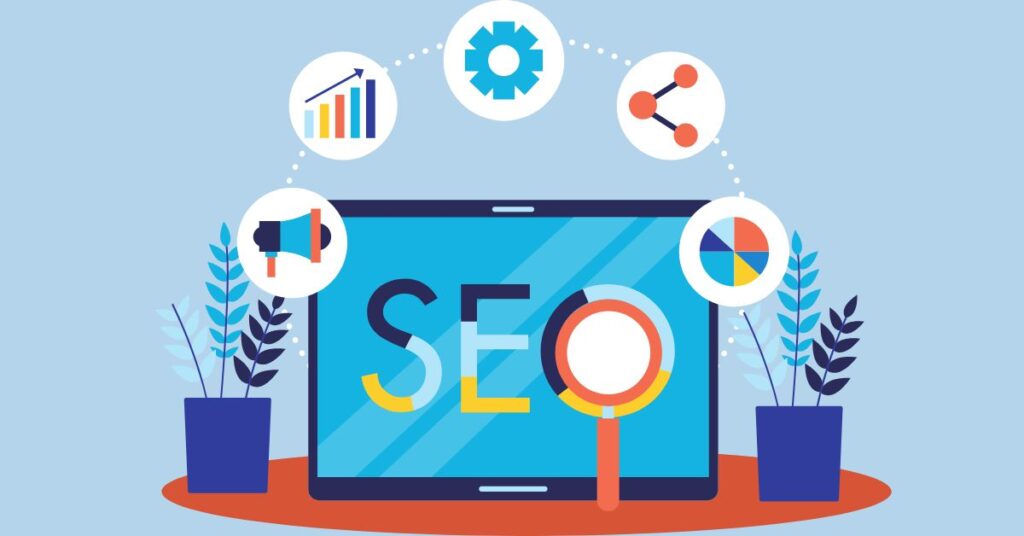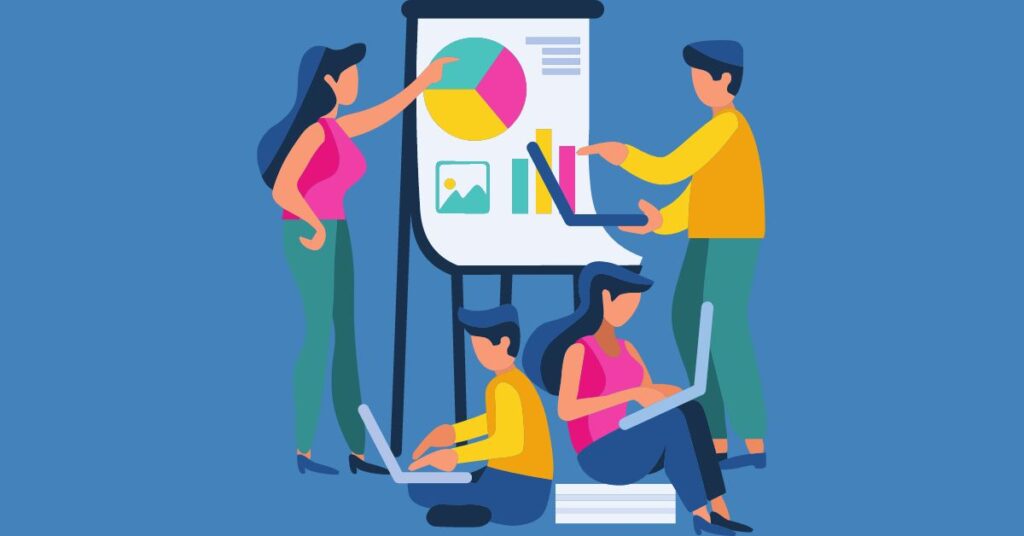First, let’s start with the definition of (SEO) search engine optimization. SEO is optimizing a website to rank higher in search engine results pages (SERPs), intending to increase organic traffic and visibility. This is achieved through various tactics such as keyword research, on-page optimization, off-page optimization, and tracking and measuring results.
Now, why is search engine optimization SEO important for e-commerce websites? In today’s digital age, most consumers use search engines to find the products they want online. As a result, e-commerce websites must rank high in search engine results to attract potential customers and drive sales.
But ranking high in search engine results is a challenging feat. Optimizing your website and content in line with search engine algorithms requires a strategic and consistent effort.

This is where SEO comes in. By implementing effective SEO tactics, e-commerce websites can improve search engine rankings, attract organic traffic, and drive more sales.
So what topics will we be covering in this blog post? We’ll start with keyword research, which is the foundation of any successful SEO strategy.
We’ll also dive into on-page optimization, which involves optimizing elements on your website, such as title tags, meta descriptions, header tags, and website speed.
We’ll then move on to content optimization, discussing the importance of creating high-quality and optimized content for your e-commerce website.
Next, we’ll talk about off-page optimization, which includes building backlinks and using social media to support your SEO efforts.
Finally, we’ll cover tracking and measuring results, so you can see the impact of your SEO efforts and make necessary adjustments.
So there you have it! By the end of this blog post, you will have a solid understanding of what SEO is, why it’s necessary for e-commerce websites, and the various tactics you can use to improve your search engine rankings and drive sales. Let’s get started!

Keyword Research
Keyword research identifies the words and phrases people use to search for products or services similar to your e-commerce website. These keywords and phrases can then be used to optimize your website and content for search engines, which will help you rank higher in search engine results pages (SERPs).
So why is keyword research so important for SEO? Keyword research allows you to understand what your target audience is searching for and how to effectively target those searches with your website content.
With keyword research, you can optimize your website, and content for keywords people are searching for to impact your search engine rankings.
So how do you choose the right keywords for your e-commerce website? Start by thinking about the products and services you offer and the words and phrases people might use to search for those products and services. You can also use keyword research tools, which we’ll discuss shortly, to generate a list of related keywords and phrases. When choosing keywords, look for keywords with high search volume and low competition. You also want to ensure that the keywords you choose align with your target audience and the goals of your e-commerce website.
Now let’s talk about tools for conducting keyword research. Several free and paid tools are available, each with its own strengths and weaknesses. Some popular keyword research tools include Google Keyword Planner, SEMrush, and Ahrefs. These tools will help you generate a list of relevant keywords, provide data on search volume and competition, and give you insights into the keywords your competitors are targeting.
Keyword research is a critical aspect of SEO for e-commerce websites. Researching and choosing the right keywords can improve your search engine rankings, increase organic traffic, and drive more sales.
Remember to select keywords with high search volume and low competition and utilize keyword research tools to make the process easier and more effective.

On-page Optimization
So, what is on-page optimization? On-page optimization refers to optimizing individual web pages to rank higher in search engine results pages (SERPs) and attract more organic traffic.
This includes optimizing various elements on your website, such as title tags, meta descriptions, header tags, website speed, product images and videos, and more.
Why is on-page optimization so crucial for SEO? On-page optimization helps search engines understand what your website and its individual pages are about, which allows them to rank your website for relevant keywords and phrases.
A well-optimized website is also more straightforward for users to navigate, which can improve user experience and engagement, both of which are essential ranking factors for search engines.
Let’s now talk about some of the critical elements of on-page optimization:

- Title tags: Title tags are the headlines appearing on search engine results pages (SERPs). They are essential in determining your website’s search engine rankings, providing a brief overview of what a page is about. When writing title tags, ensure they accurately reflect the page’s content and include relevant keywords.
- Meta descriptions: Meta descriptions are short descriptions that appear below the title tag in the search engine results pages. They provide more information about the content of a page and can help entice users to click through to your website. When writing meta descriptions, make sure they are compelling and accurately reflect the page’s content.
- Header tags: Header tags (H1, H2, H3, etc.) help structure your website’s content and make it easier for users to read. Header tags also help search engines understand the hierarchy of your content, which can improve your search engine rankings.
- Website speed is essential in determining your search engine rankings and user experience. A slow-loading website can negatively impact user engagement and lead to a high bounce rate, harming your search engine rankings. To improve website speed, ensure your website is optimized for fast loading, and use a reliable web hosting service.
- Product images and videos: Product images and videos can significantly attract users to your e-commerce website. Ensure your product images and videos are high-quality, accurately reflect the product, and are optimized for users and search engines.
On-page optimization is a critical aspect of SEO for e-commerce websites. Optimizing title tags, meta descriptions, header tags, website speed, product images, and videos can improve your search engine rankings, increase organic traffic, and drive more sales. Regularly evaluate and update your on-page optimization to stay ahead of the competition.

Content Optimization
The role of content in SEO is crucial. Search engines use the content on your website to understand what your website is about and to determine its relevance to users. High-quality, optimized content can help you rank higher in search engine results pages (SERPs), attract organic traffic, and drive more sales.
So, how do you create high-quality, optimized content for your e-commerce website? Here are some best practices to keep in mind:
- Write unique product descriptions: Your product descriptions should be unique, descriptive, and accurately reflect the product. They should also include relevant keywords, phrases, and information that differentiates your products.
- Use high-quality images and videos: High-quality images and videos can showcase your products and provide a better user experience. They can also help to improve your search engine rankings, as search engines favor websites with high-quality media.
- Keep your content up-to-date: Regularly updating your content with new products, promotions, and information can help keep your website fresh and relevant and improve your search engine rankings.
- Write blog content that supports SEO efforts: Your blog can be essential in helping your SEO efforts. You can increase organic traffic and improve your search engine rankings by writing relevant blog posts about your products. When writing blog posts, include relevant keywords and phrases and provide valuable information your users will find helpful.
Content is an essential aspect of SEO for e-commerce websites. Creating high-quality, optimized content that accurately reflects your products can improve your search engine rankings, increase organic traffic, and drive more sales. Remember to keep your content up-to-date and write blog content supporting your SEO efforts.

Off-page Optimization
We’ll dive into off-page optimization, which refers to optimization techniques performed outside your website. Off-page optimization is as important as on-page optimization to improve your search engine rankings and drive more traffic to your e-commerce website.
So, what exactly is off-page optimization, and why is it essential for e-commerce websites? Off-page optimization refers to all the activities you perform outside of your website to improve its visibility, authority, and relevance in the eyes of search engines. This includes building high-quality backlinks and utilizing social media for SEO.
Let’s take a closer look at each of these off-page optimization techniques:
- Building high-quality backlinks: Backlinks are links from other websites that point to your website. High-quality backlinks from reputable websites can help improve your search engine rankings and increase your website’s visibility and authority. To build high-quality backlinks, you can reach out to other websites in your niche and ask them to link to it or create valuable content that other websites will naturally want to link to.
- Utilizing social media for SEO: Social media can be a powerful tool for driving traffic to your e-commerce website and improving your rankings. You can reach a wider audience, build brand awareness, and drive more sales by creating engaging content and promoting your products on social media. Additionally, social media signals, such as likes, shares, and followers, can be used by search engines to determine the relevance and authority of your website.
Off-page optimization is as important as on-page optimization to improve your search engine rankings and drive more traffic to your e-commerce website. Building high-quality backlinks and utilizing social media for SEO can help to increase your website’s visibility, authority, and relevance in the eyes of search engines and ultimately lead to more sales.

Tracking and Measuring Results – SEO
It’s crucial to monitor the impact of your optimization efforts on your e-commerce website’s traffic and sales. By tracking and measuring results, you can see what’s working and what’s not and adjust your strategy accordingly.
Let’s dive in!
- You need to follow and measure the results of your SEO efforts to determine your strategy’s effectiveness. Doing this will lead to less wasted time and resources and missed opportunities for improvement. By tracking and measuring your results, you can better understand your target audience, their behavior and interests, and what content and optimization techniques resonate with them.
- Google Analytics is a free tool that provides insights into your website’s traffic, audience, and behavior. With Google Analytics, you can track your website’s traffic, conversion rates, and traffic sources. This information is critical to understanding how your SEO efforts impact your e-commerce website’s traffic and sales.
- In addition to Google Analytics, many tools are available for tracking keyword rankings. Keyword ranking tools allow you to monitor your website’s rankings for specific keywords in search engine results pages (SERPs). This information helps understand the impact of your on-page and off-page optimization efforts on your search engine rankings.
Tracking and measuring the results of your SEO efforts is crucial to the success of your strategy. Using tools like Google Analytics and keyword ranking tools, you can gain valuable insights into your target audience, their behavior and interests, and the impact of your optimization efforts on your e-commerce website’s traffic and sales. So, track and measure your results regularly and adjust your strategy to continue driving traffic and sales to your website.

Wrap It All Up – Search Engine Optimization
We’ve covered a lot of ground in this guide to search engine optimization (SEO) for e-commerce websites. By now, you should have a solid understanding of the importance of SEO for e-commerce websites and the critical elements of a successful SEO strategy.
Here’s a quick recap of what we’ve covered:
- Definition of SEO and its importance for e-commerce websites.
- Keyword research, including the importance of choosing the right keywords and tools for conducting keyword research.
- On-page optimization, including optimizing title tags and meta descriptions, header tags, website loading speed, and product images and videos.
- Content optimization, including the role of content in SEO and best practices for creating high-quality, optimized content for e-commerce websites.
- Off-page optimization, including the importance of building high-quality backlinks and utilizing social media for SEO.
- Tracking and measuring results, including the importance of monitoring and measuring the results of your SEO efforts and tools for doing so, such as Google Analytics and keyword ranking tools.
Now that you have a comprehensive understanding of SEO for e-commerce websites, it’s time to put this knowledge into practice. Remember, SEO is a long-term strategy, so it’s essential to be patient and persistent in your efforts.
But with hard work and dedication, you can optimize your e-commerce website and see an increase in traffic and sales. Keep learning, stay curious, and most importantly, don’t be afraid to take risks and try new things.







